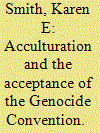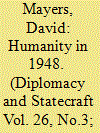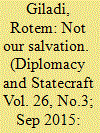| Srl | Item |
| 1 |
ID:
123261


|
|
|
|
|
| Publication |
2013.
|
| Summary/Abstract |
This article contributes to the burgeoning literature on why states ratify human rights treaties. It first analyses why Ireland, the United Kingdom and the United States did not initially ratify or accede to the 1948 Genocide Convention, and then explores why the three countries eventually did accept it, 20-40 years after it was approved by the United Nations General Assembly. The extent to which material costs and benefits, the logic of appropriateness, and acculturation played a role in each of the three cases is assessed. Acculturation is particularly evident in the Irish case, but it also helps to explain the UK and US acceptance of the Convention.
|
|
|
|
|
|
|
|
|
|
|
|
|
|
|
|
| 2 |
ID:
141961


|
|
|
|
|
| Summary/Abstract |
By approving prohibitions on genocide and embracing the Universal Declaration of Human Rights (UDHR), the United Nations in 1948 sustained a theory premised on the centrality of people—both in their collective and individual capacities—that enjoyed primacy over the claims of the sovereign state. This affirmation of human rights dovetailed with the UN’s earlier endorsement of the Nuremberg principles with their emphasis on personal accountability. The melding of privileges and responsibilities gestured toward, although it did not fully encompass, that philosophical line strenuously espoused at the time by the eminent legal theorist, Hersch Lauterpacht: the state is not a sanctified end but merely the custodian of the welfare and ultimate purpose of human beings. This analysis examines the Genocide Convention and the UDHR and brings into conversation their drafting histories, politics, and diplomacy. It traces the saga of two seminal documents and their tandem fates in Cold War America. The collectivist project of the Genocide Convention and the individualistic emphasis of the UDHR are usefully placed in the same analytical frame, something seldom done in the literature that deals with human rights and norms-making of the late 1940s and their interaction with Cold War dilemmas. As peoples and governments pick their way through the hazards of the twenty-first century, it is exigent—for the sake of upright bearing—to stay mindful of the orientation prescribed in the Genocide Convention and the UDHR.
|
|
|
|
|
|
|
|
|
|
|
|
|
|
|
|
| 3 |
ID:
141962


|
|
|
|
|
| Summary/Abstract |
Jewish individuals and organisations played a cardinal role in making and promoting the 1948 Genocide Convention. The early attitude of the Jewish state—established a few months before the Convention’s conclusion—has not hitherto been explored. This analysis reconstructs Israel’s involvement in the 1951 advisory proceedings at the International Court of Justice concerning the Convention. Based on Ministry of Foreign Affairs archives and Court records, it demonstrates that contrary to what scholarship on subsequent episodes assumes or implies, Israel had no particular attachment to, nor was it vested in, the Convention. Rather, its attitude ranged from indifference and disinterest to scepticism and hostility. It allowed Israeli diplomats to utilise the Convention as a means to affect other neither urgent nor imperative foreign policy ends.
|
|
|
|
|
|
|
|
|
|
|
|
|
|
|
|